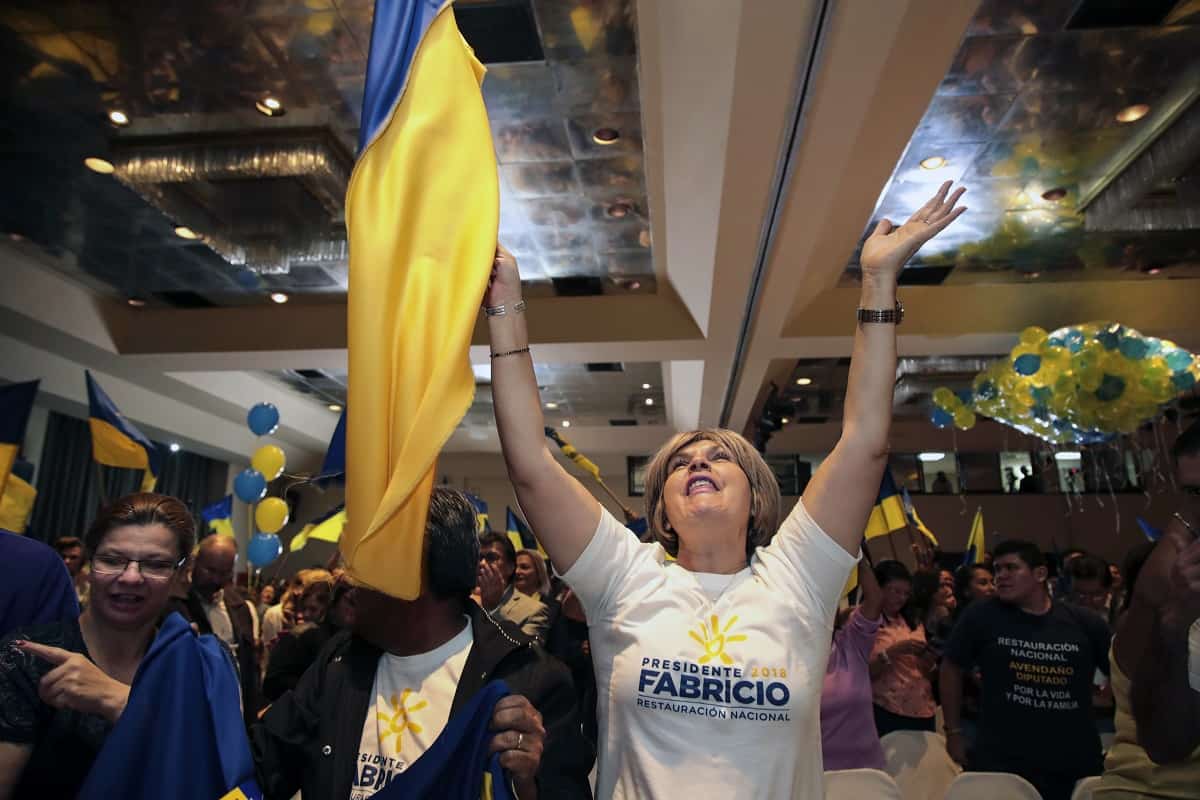Costa Rica will return to the polls on April 1 with only a few certainties: a new political map, heightened religious fervor and the geographical divisions in the country.
Fabricio Alvarado and Carlos Alvarado are now competing to win Costa Rica’s presidency in the second round of voting. This past Sunday’s election showed a profound change in Costa Rica’s political map and the popular response to the country’s marginalized areas.
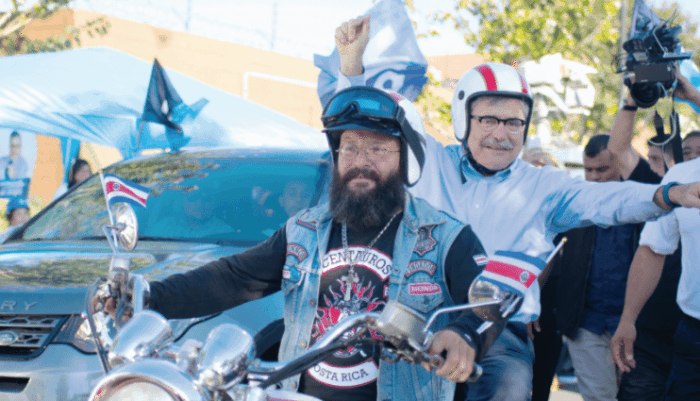
The election also confirmed the huge impact of religion-driven voters, who represented half a million votes (24,9%) in representation of the growing and dynamic evangelic sector combined with the indispensable support of conservative forces within traditional Catholicism, the majority in Costa Rica.
The former journalist, Pentecostal preacher and legislator Fabricio Alvarado now symbolizes something much bigger than just his small party, National Restoration, which was founded by the pastor Carlos Avendaño after political disagreements with former legislator Justo Orozco. He also represents the evangelical churches that work tirelessly through prayers and social work to promote a “pro-life and pro-family” political agenda, which the Catholic Church has boosted less and less with each election.

The evangelical candidate, 43, who never before expressed political ambition, has demonstrated the consequences of the drop in popular support for traditional parties.
The election also rearranged the map for parties that do not draw on ideologies of discrimination: the Broad Front went from nine legislators to one, and Otto Guevara’s Libertarian Movement is out after 20 years of parliamentary presence. As for the historically dominant National Liberation Party (PLN), they saw their dominance of rural territories snatched away. The center of the country turned toward the Citizen Action Party (PAC), which is no longer an alternative force and seeks to stay in power.
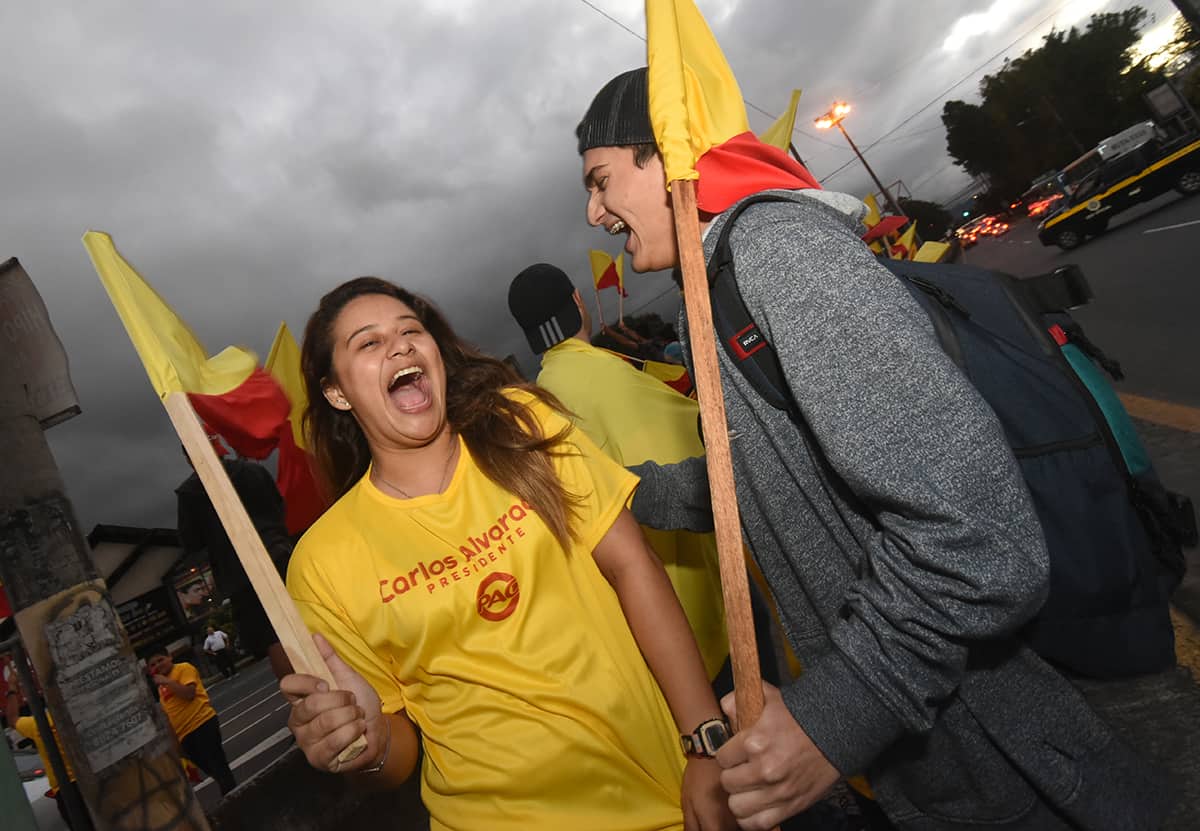
On Sunday, central regions voted once more for PAC and Carlos Alvarado (21.6 percent). On the national map, you can see his triumph in the provinces of San José, Heredia and Cartago, but National Restoration won the four coastal or border provinces: Alajuela, Guanacaste, Limón and Puntarenas. In these last two, the votes for Fabricio Alvarado even surpassed the 40 percent minimum required for winning the presidency in a first round.
This contrast can also be seen on smaller scales. In many cantons, PAC obtained better results in the central districts and National Restoration did better in outlying areas with, in general terms, lower quality of life. An example of this can be seen in the vote for presidential ballots in the central canton of Alajuela, where the PAC triumphed only in one district, the central, with 25 percent. The other eight districts of the canton were left in hands of Fabricio Alvarado’s party, and none favored Liberation.
San José showed the same pattern. PAC won the most central and prosperous districts (Carmen, Merced, Catedral, Zapote, San Francisco de Dos Ríos) and National Restoration won in Hospital, La Uruca, Pavas, Hatillo and San Sebastián.
In some districts, such as Katira in Guatuso or Bijagua in Upala, National Restoration got more than 50% of the votes.
Voter turnout, despite some fears, stayed at what have become normal levels for this century. Only 34 percent of voters stayed home, confirming ongoing popular trust in the elections as a form of political action.
Nevertheless, as in previous elections, in general it’s the more marginalized regions of the country that vote less, as in the case of Talamanca. In this coastal, border and indigenous canton, only half of the population turned out to vote.
In the Colorado district of the canton of Guácimo, which borders Nicaragua in the Calero Island region, abstention was bigger: 58 percent. Golfito’s Central District, despite being considered an urban center (municipality, university, hospital and so forth), also showed high abstention at 44.9 percent.

God’s big moment?
This was the first time that the traditional Liberation Party came in third (18.6 percent) . This shows not only the party’s profound internal crisis, but also, with new clarity, the collapse of the political sympathies that marked the dispute for power in Costa Rica during the past 70 years.
“We finally see a historical moment. The political identities and traditions are out,” explained researcher Ronald Alfaro, director of the University of Costa Rica’s (UCR) Political Center for Studies and Investigation (CIEP).
“The outlying areas were Liberation’s lifesavers, but now we see they aren’t anymore,” adds Alfaro, coordinator of the CIEP polls that helped take the pulse of this campaign and now understand the results. With weakened party borders and the rise of ideological politics, the population is more susceptible to mass manifestations for or against the concrete topics that cause polarization, as occurred in 2006 with the Central American Free Trade Agreement with the United States (CAFTA), or, in this case, with religion.
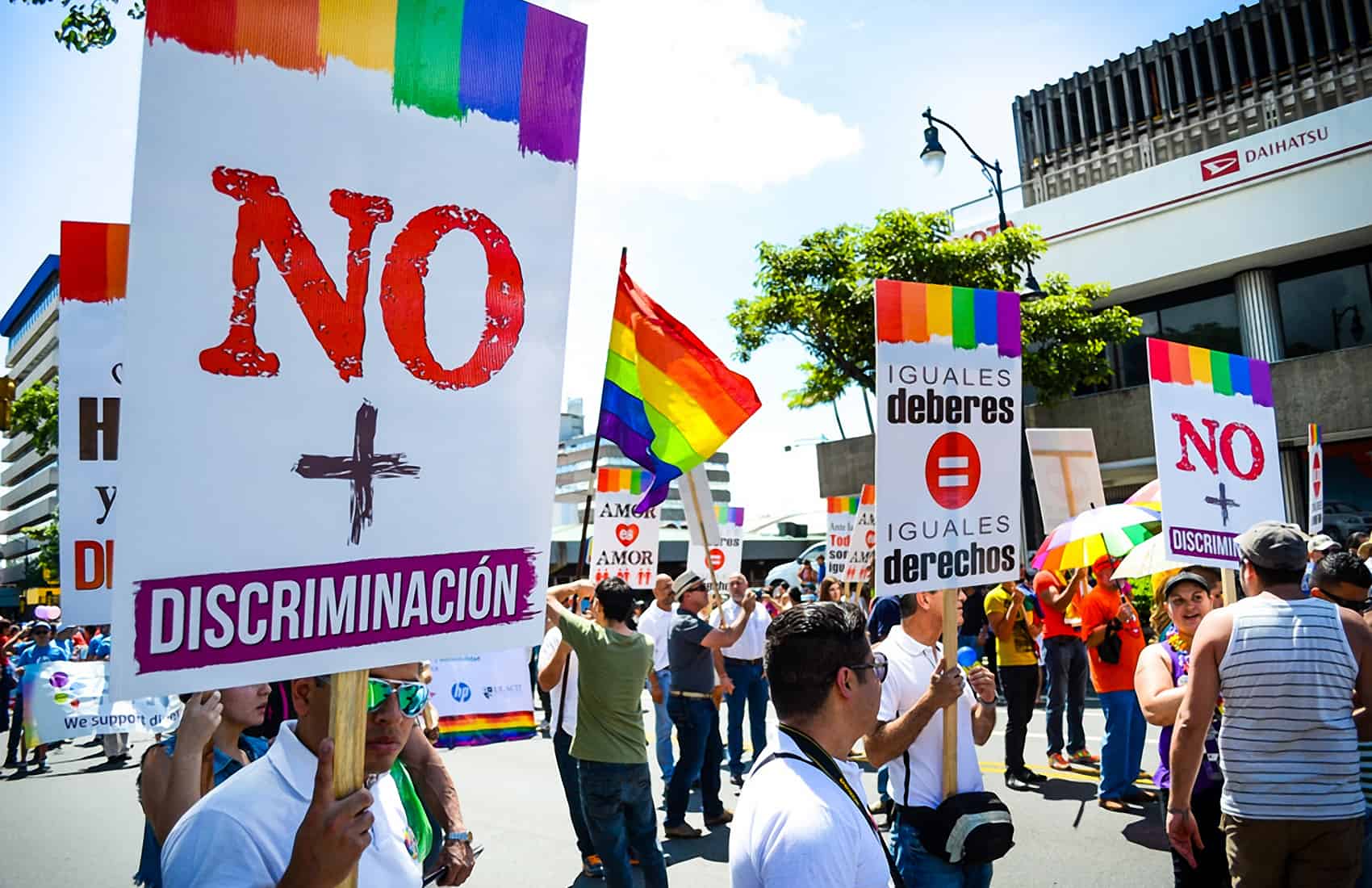
The Inter-American Court of Human Rights’ ruling on Jan. 9 is now confirmed as the decisive element of these elections. No one ever imagined that the ruling in favor of same-sex marriage would take place at the height of the campaign. “I never saw it coming,” admitted Liberation candidate Antonio Álvarez Desanti in his concession speech.
The impact of the religious surge clouded the possibilities of Juan Diego Castro (who ended up with 9.5 percent of the votes) and his anti-establishment, anti-corruption approach. His messages of mano dura didn’t permeate enough or lacked an organized base, especially given that he represented a weakened National Integration Party (PIN), which will return in May to the Legislative Assembly after 16 years.
Nothing was as strong as the religious shock. In the last two weeks, election sympathies, which had already been volatile, were completely reordered by the debate between those who feel that Christian values are threatened, and those who believe Costa Rica must advance in ensuring the rights of sexual minorities. Discussion of abortion and sex ed elevated emotions still further, contradicting the Supreme Elections Tribunal’s (TSE) plea for a rational vote.
Costa Rica has earthly problems, but this election season ended over the rainbow
At the polls, Fabricio Alvarado managed to hold onto his abrupt rise from the middle of January. As untold as it looks, it isn’t a surprise, at least for those who have studied the evolution of religion in Costa Rica during the last 30 years. These three decades coincide with the increase of social inequality in the country, as demonstrated by numerous international studies.
For Laura Fuentes, expert in the sociology of religion and researcher at the National University (UNA), it was not a surprise seeing Fabricio Alvarado celebrating this Sunday.
“The Costa Rican elites have excluded a part of the population, and we now see that evangelical churches have been fruitful, working for more than 30 years with abandoned communities that have educational and labor instability or violent situations. There, the population has found support in the churches, which have complied with a role not only with affairs from the más allá [heavenly or spiritual concerns], but also with things from the más acá [here and now], responding to the needs of care, housing, preparation of leaders or scattering.” The strategy has worked.
It’s calculated that Costa Rica’s practicing evangelical population is around 20 percent. Even though it’s impossible to affirm that all of this group voted for Fabricio Alvarado, it does represent an indispensable muscle that complements other conservative groups. This communion between Catholic and evangelical authorities has been growing in recent years, and was reflected in a massive march on Dec. 3 in San José.
“That day was important. We could see in a very clear manner the size of the alliance and the potential mobilizer of masses that has this cause of defense of the traditional family, of life from the conception, or rejection towards the ‘gender ideology,’ as they call it,” said analyst Gustavo Araya.
However, the strong base and those who headed to the San José Palacio Hotel on Sunday night to celebrate Fabricio Alvarado’s triumph come from evangelical groups.
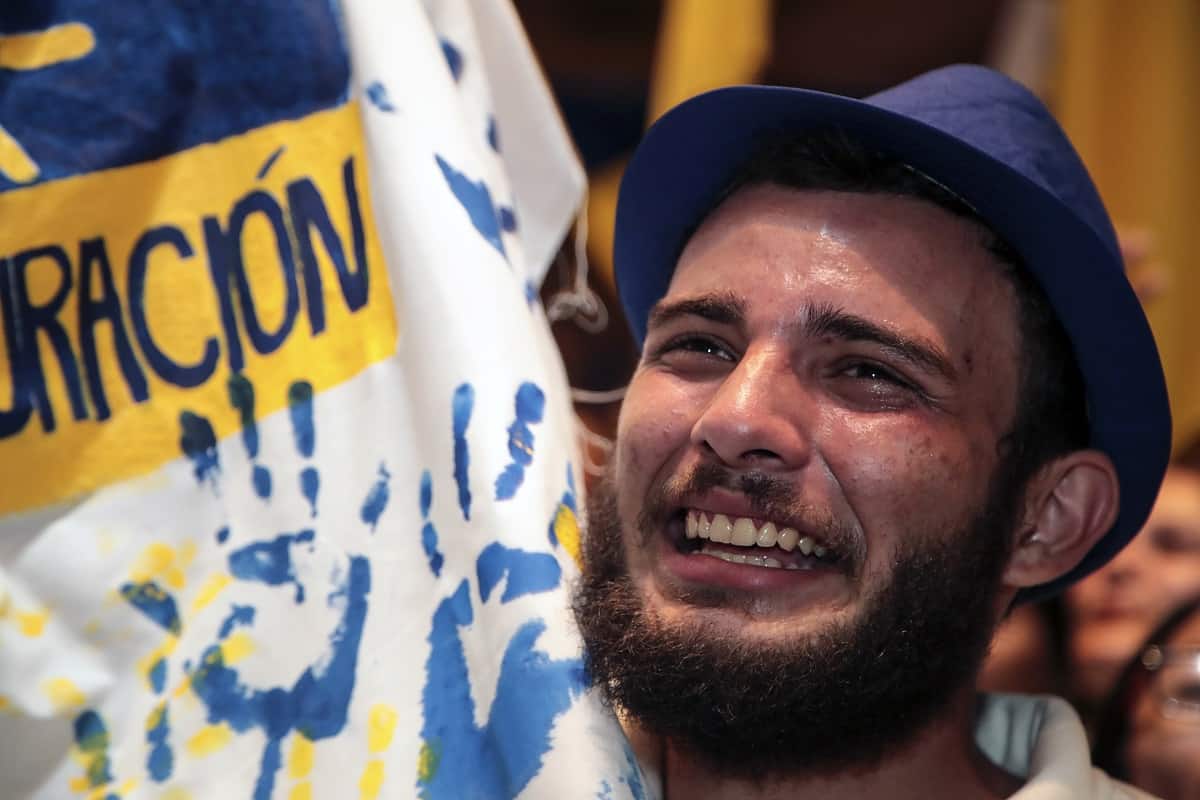
“Our bubble impedes us from understanding the strong growth in areas that traditional political actors visit only sporadically. The churches don’t. The churches are there [all the time], present with the people there, and they do constant work, house to house, often connected to an international network that has economic resources,” adds Laura Fuentes. The churches don’t go there; they live there.
To this, we add the impulse of “prosperity theology,” which exalts the success that comes with being a good Christian, whether economic or the professional. An increasing number of soccer players have become popular faces of that success. This approach was also seen in a campaign video in which Fabricio Alvarado’s wife, Laura Moscoa, spoke about the hardships of her childhood in contrast with her current well-being.
For that reason, it would be an error to limit the phenomenon to the rural and marginalized areas, warns Randall Blanco, director of the UCR’s Postgraduate in Sociology.
“There are a lot of middle class and powerful sectors that also work for what they consider to be defending the founding principle of collective life: the family,” Blanco says. Here, the evangelical movement connects with the traditional values of Costa Rica that have always been dictated by Catholic priests and bishops.
New poll in Costa Rica shows huge surge for evangelical pastor
Another video of Fabricio Alvarado was relevant: the last one before the veda, or advertising-free electoral truce preceding the vote. In the face of questions about his lack of a governing team, the candidate made public the names of various persons that have helped him in the campaign.
These included the lawyer Alexandra Loría Beeche, an anti-abortion activist and the candidate’s replacement in the Legislative Assembly while he campaigns in the second round, and Alejandro Leal, an expert on bioethics who opposed in vitro fertilization (IVF). Both are well-known Catholics. Those who once treated each other as “separate brothers” are now reunited in one family where political and ideological origins matter much less.
“Defending the family and life” is the chorus of Fabricio Alvarado’s speeches, as we heard on Election Night. It’s the message that he has repeated since his debut as a political figure from his seat in the Legislative Assembly, which he attained by chance in 2014 when the Restoration Party candidate resigned and saw in Alvarado the makings of a good communicator.
The PAC’s challenge
While this theory is not backed up with numbers, it seems possible that religious shock also accounted for some of the votes that allowed Carlos Alvarado to pass to the second round.
The final result placed Alvarado nearly 62,000 votes over Álvarez Desanti, despite the TSE’s first report on Election Night which placed the liberacionista ahead of the PAC and made PAC sympathizers nervous. Their number had multiplied in the last two weeks of the campaign.
By coming in second, Carlos Alvarado, a former Minister of Human Development and Labor, was able to surpass, at least for the moment, the questionings of President Luis Guillermo Solís’s administration and the criticism of the PAC for corruption related to the cementazo, the case of traffic of influences that dominated the beginning of the campaign in October.
With the key support of the founders of the party and PAC legislators critical of the current legislation, Carlos Alvarado was able to move up in the polls with speeches that were socially and geographically inclusive, and promoted the rights of the sexual minorities.
Some analysts worry that the campaign ahead of the second round will show even more polarization around religious matters and leave out pressing “earthly” topics, such as the government’s fiscal crisis and numerous pending decisions related to the country’s economical and social sustainability.
The PAC, in leaving behind its label as an alternative party, faces the challenge of being accountable about the current administration, which, as Carlos Alvarado insists, “with its errors and successes, but better than the past ones and future vision.”
Facing this speech, his adversary clings to the motto of“clean hands” and “let’s do it together.” He seems to be listening to political and economical sectors that, in the absence of consolidated frames of governance, see opportunities in National Restoration.
Just like a soccer team that has classified for the World Cup with thousands of committed followers, but not enough players, Fabricio Alvarado’s party has offerings everywhere.
The game of alliances for a second round has started with gestures and rumors, but it’s two months away, an eternity for the current political dynamics.
“Two months are craziness,” said expert Daniel Zovatto this Monday, director of IDEA International, convinced that Sunday’s election revealed huge changes in one country. Or two.
This article was originally published at the Semanario Universidad on Feb. 7 by journalist Álvaro Murillo. Read more from Alvaro in his Tico Times column, “No Sugar Please.”


